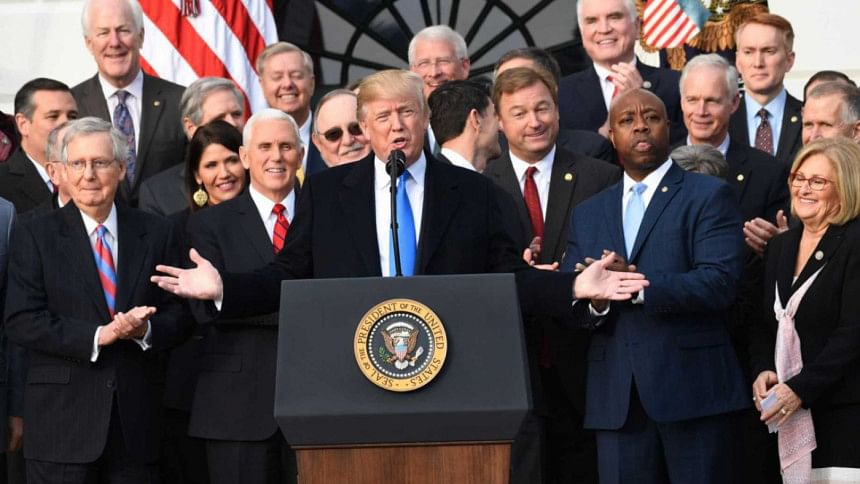The US Donor Relief Act of 2017

Never has a piece of legislation labelled as both a tax cut and a reform been received with as much disapproval and derision as the bill passed by the US Congress and signed into law by President Donald Trump just before Christmas. The Republicans who voted for the bill (no Democrats did) claim that their gift will come to be appreciated later, as Americans see their take-home pay go up. They are almost certainly wrong. Rather, the bill wraps into one package all that is wrong with the Republican Party, and to some extent, the debased state of American democracy.
The legislation is not "tax reform" by even the most elastic reading. Reform entails closing distortionary loopholes and increasing the fairness of the tax code. Central to fairness is the ability to pay. But this tax legislation reduces taxes by tens of thousands of dollars, on average, for those most able to pay (the top quintile). And, when fully implemented (in 2027), it will increase taxes on a majority of Americans in the middle (the second, third, and fourth quintiles).
The US tax code was already regressive long before Trump's presidency. Indeed, the billionaire investor Warren Buffett, one of the wealthiest men in the world, famously complained that it was wrong that he paid a lower tax rate than his secretary. The new legislation makes America's tax system even more regressive.
It is now universally recognised that growing inequality is a key economic problem in the United States, with those at the top capturing almost all the gains in GDP over the past quarter-century. The new legislation adds insult to injury: rather than offsetting this disturbing trend, the Republicans' "reform" gives even more to the top.
A more distorted economy is not a healthy economy. The International Monetary Fund has emphasised that a more unequal society worsens economic performance—and the new tax legislation will lead inexorably to a more unequal society.
Much of the complexity and distortion in the US tax code arises from different types of income being taxed at different rates. Such differential treatment leads not only to the (correct) perception that the tax code is unfair, but also to inefficiencies: resources move to favoured sectors, and are wasted as firms try to convert their incomes and activities into the more favoured forms. The worst provisions of the old tax code—such as the carried-interest loophole, which allows job-destroying private-equity firms to pay taxes at low rates—have been retained, and new categories of favoured income (earned by so-called pass-through entities) have been created.
The hoped-for spur to economic growth is unlikely to materialise, for several reasons. First, the economy is already at or near full employment. If the US Federal Reserve comes to view that to be the case, it will raise interest rates at the first sign of a significant increase in aggregate demand. And higher interest rates mean that investment, and thus growth, will slow, even if the consumption of the very rich increases.
Moreover, squeezing the "blue" (Democratic) states, including California and New York, by including provisions in the tax bill aimed specifically at them, not only further widens America's political divide; it's also bad economics. No sane government would undermine the most dynamic parts of its economy, and yet that is what the Trump administration is doing. Special tax breaks for the real-estate sector may help Trump and his son-in-law, Jared Kushner, but it does not make America great or competitive. And limiting the deductibility of state income tax and property tax will almost surely reduce investment in education and infrastructure—again, not a sound strategy for increasing American competitiveness. Other new provisions will also hurt the US economy.
Because the fiscal deficit will increase—the only question is by how much, with my bet being that it will be far larger than current estimates of USD 1-1.5 trillion—the trade deficit will increase as well, regardless of whether Trump pursues more nativist/protectionist policies. Lower exports and higher imports will further undermine US manufacturing. Once again (as they have done with health care and the tax cuts), Trump is betraying his core supporters.
But the Republican Party is cynical. Its leaders are stuffing themselves at the trough—Trump, Kushner, and many others in his administration are among the biggest winners—thinking that this may be their last chance at such a feast. And no Republican believes the party can get away with it more firmly than Trump does.
That is why the legislation is structured to give individuals temporary tax cuts, with corporations getting a permanent reduction in their tax rate. The Republicans seem confident that voters will not see beyond the next paycheque. But voters are not so easily manipulated: they have seen through the trick, and are rightly convinced by the numerous studies, from sources in and out of government, showing that the lion's share of the tax cut goes to corporations and the very rich.
Trump's tax legislation also attests to many Republicans' belief that dollars are more important than voters. All that matters is pleasing their corporate sponsors, who will reward the party with contributions, which will be used to buy votes, thereby ensuring the perpetuation of a corporate-driven political agenda.
Let's hope that Americans really are smarter than the greedy corporate CEOs and their cynical Republican servants believe. With midterm congressional elections coming in November, they will have ample opportunity to prove it.
Joseph E Stiglitz is the winner of the 2001 Nobel Memorial Prize in Economic Sciences. His most recent book is Globalization and its Discontents Revisited: Anti-Globalization in the Era of Trump.
Copyright: Project Syndicate, 2018.
www.project-syndicate.org
(Exclusive to The Daily Star)





Comments